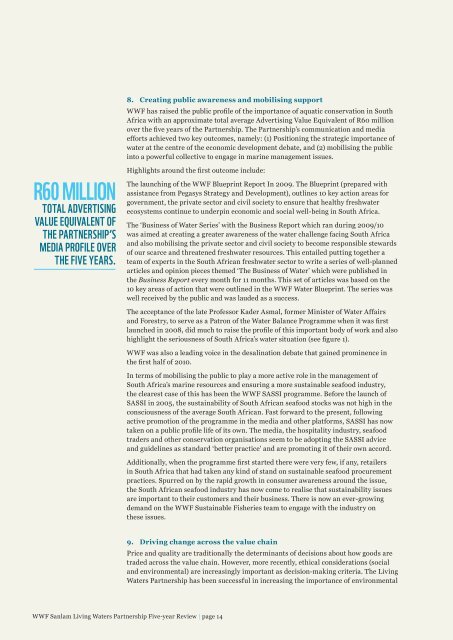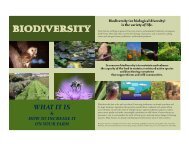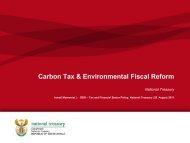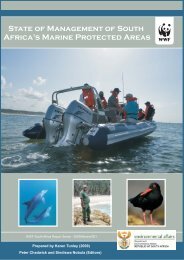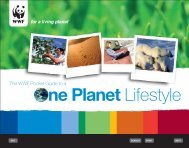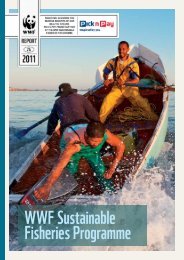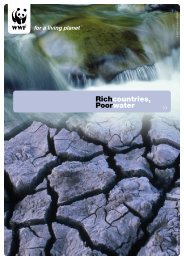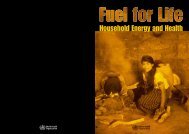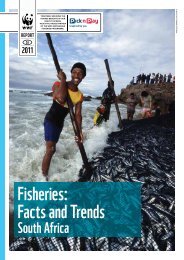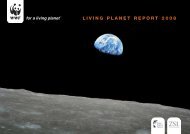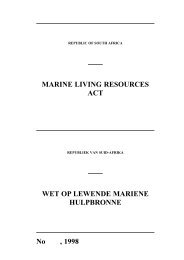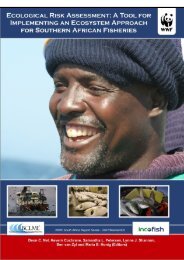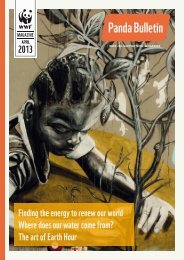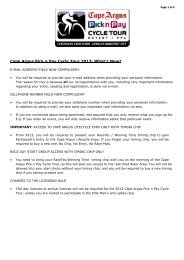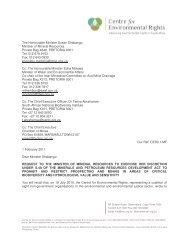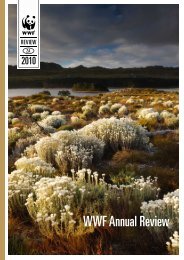WWF Sanlam Living Waters Partnership - WWF South Africa
WWF Sanlam Living Waters Partnership - WWF South Africa
WWF Sanlam Living Waters Partnership - WWF South Africa
Create successful ePaper yourself
Turn your PDF publications into a flip-book with our unique Google optimized e-Paper software.
R60 MiLLion<br />
totAL AdveRtiSinG<br />
vALue equivALent oF<br />
the PARtneRShiP’S<br />
MediA PRoFiLe oveR<br />
the Five yeARS.<br />
8. Creating public awareness and mobilising support<br />
<strong>WWF</strong> has raised the public profile of the importance of aquatic conservation in <strong>South</strong><br />
<strong>Africa</strong> with an approximate total average Advertising Value Equivalent of R60 million<br />
over the five years of the <strong>Partnership</strong>. The <strong>Partnership</strong>’s communication and media<br />
efforts achieved two key outcomes, namely: (1) Positioning the strategic importance of<br />
water at the centre of the economic development debate, and (2) mobilising the public<br />
into a powerful collective to engage in marine management issues.<br />
Highlights around the first outcome include:<br />
The launching of the <strong>WWF</strong> Blueprint Report In 2009. The Blueprint (prepared with<br />
assistance from Pegasys Strategy and Development), outlines 10 key action areas for<br />
government, the private sector and civil society to ensure that healthy freshwater<br />
ecosystems continue to underpin economic and social well-being in <strong>South</strong> <strong>Africa</strong>.<br />
The ‘Business of Water Series’ with the Business Report which ran during 2009/10<br />
was aimed at creating a greater awareness of the water challenge facing <strong>South</strong> <strong>Africa</strong><br />
and also mobilising the private sector and civil society to become responsible stewards<br />
of our scarce and threatened freshwater resources. This entailed putting together a<br />
team of experts in the <strong>South</strong> <strong>Africa</strong>n freshwater sector to write a series of well-planned<br />
articles and opinion pieces themed ‘The Business of Water’ which were published in<br />
the Business Report every month for 11 months. This set of articles was based on the<br />
10 key areas of action that were outlined in the <strong>WWF</strong> Water Blueprint. The series was<br />
well received by the public and was lauded as a success.<br />
The acceptance of the late Professor Kader Asmal, former Minister of Water Affairs<br />
and Forestry, to serve as a Patron of the Water Balance Programme when it was first<br />
launched in 2008, did much to raise the profile of this important body of work and also<br />
highlight the seriousness of <strong>South</strong> <strong>Africa</strong>’s water situation (see figure 1).<br />
<strong>WWF</strong> was also a leading voice in the desalination debate that gained prominence in<br />
the first half of 2010.<br />
In terms of mobilising the public to play a more active role in the management of<br />
<strong>South</strong> <strong>Africa</strong>’s marine resources and ensuring a more sustainable seafood industry,<br />
the clearest case of this has been the <strong>WWF</strong> SASSI programme. Before the launch of<br />
SASSI in 2005, the sustainability of <strong>South</strong> <strong>Africa</strong>n seafood stocks was not high in the<br />
consciousness of the average <strong>South</strong> <strong>Africa</strong>n. Fast forward to the present, following<br />
active promotion of the programme in the media and other platforms, SASSI has now<br />
taken on a public profile life of its own. The media, the hospitality industry, seafood<br />
traders and other conservation organisations seem to be adopting the SASSI advice<br />
and guidelines as standard ‘better practice’ and are promoting it of their own accord.<br />
Additionally, when the programme first started there were very few, if any, retailers<br />
in <strong>South</strong> <strong>Africa</strong> that had taken any kind of stand on sustainable seafood procurement<br />
practices. Spurred on by the rapid growth in consumer awareness around the issue,<br />
the <strong>South</strong> <strong>Africa</strong>n seafood industry has now come to realise that sustainability issues<br />
are important to their customers and their business. There is now an ever-growing<br />
demand on the <strong>WWF</strong> Sustainable Fisheries team to engage with the industry on<br />
these issues.<br />
9. Driving change across the value chain<br />
Price and quality are traditionally the determinants of decisions about how goods are<br />
traded across the value chain. However, more recently, ethical considerations (social<br />
and environmental) are increasingly important as decision-making criteria. The <strong>Living</strong><br />
<strong>Waters</strong> <strong>Partnership</strong> has been successful in increasing the importance of environmental<br />
<strong>WWF</strong> <strong>Sanlam</strong> <strong>Living</strong> <strong>Waters</strong> <strong>Partnership</strong> Five-year Review | page 14


